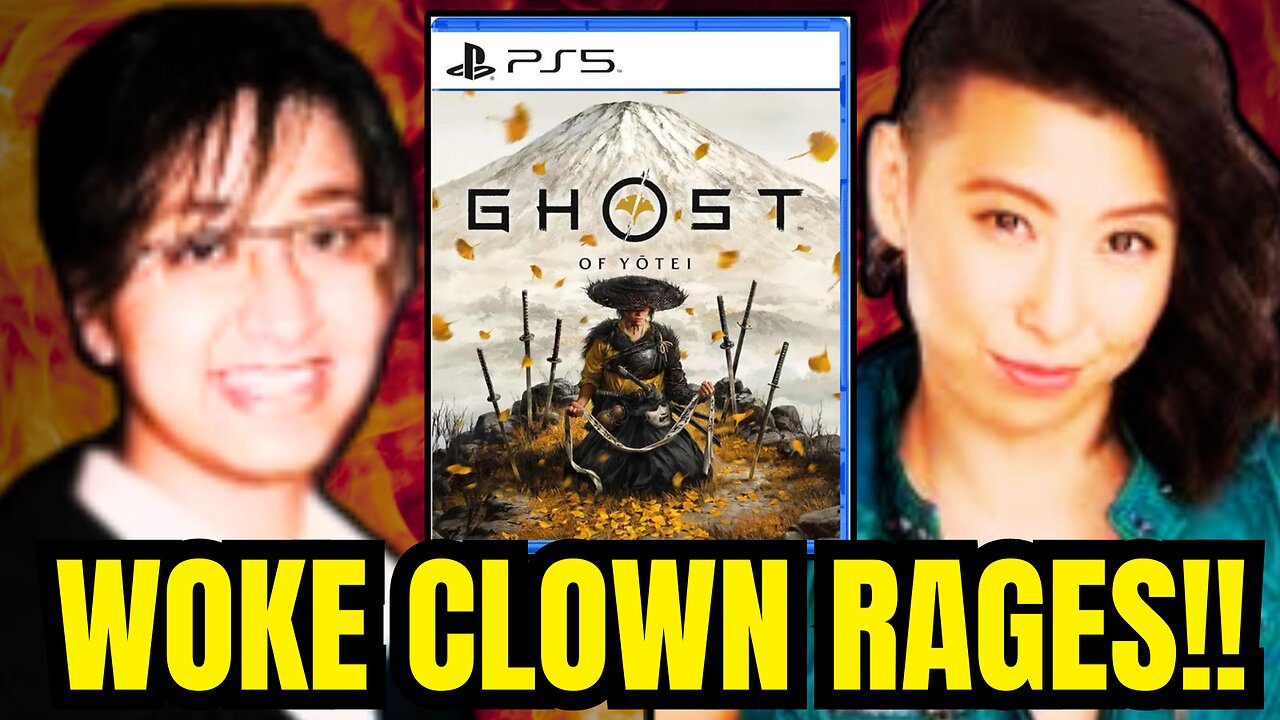Premium Only Content

Woke Journo RAGES Against Gamers Criticizing Ghost of Yotei Actress!
In a misguided attempt to defend Ghost of Yotei actor Erika Ishii, Zarmena Khan's recent article exemplifies the ongoing war against gamers who dare to voice their opinions about the Ghost of Yotei reveal. After the game’s reveal at the PlayStation State of Play, which generated positive Ghost of Yotei reactions, a small faction of the gaming community began expressing valid concerns about the Ghost of Tsushima 2 sequel. Instead of engaging with these fans, Khan chose to vilify them, labeling them as trolls and harassers—a classic case of blaming gamers for merely speaking up about the Ghost of Yotei controversy.
The core of Khan's argument rests on the notion that criticism of Ishii—a vocal advocate for her LGBTQ identity and self-identified “woke” values in the Ghost of Yotei game—is unfounded. She dismisses these criticisms as “absurd complaints” while ignoring the fact that many players seek authenticity and historical accuracy in their gaming experiences. Rather than addressing these legitimate concerns, Khan insults gamers for expressing their thoughts, labeling them as entitled and immature.
It's alarming to see Khan insinuate that Ishii’s personal choices, including her preferred pronouns and hairstyle, should be beyond reproach. In doing so, she neglects to acknowledge that gamers have a right to their opinions, even if they don’t align with her views. The idea that Erika Ishii should be shielded from all criticism simply because she belongs to the LGBTQ community is a flawed perspective that stifles dialogue and accountability within the Ghost of Yotei fanbase.
Khan’s article also quotes a particularly ridiculous troll who lamented Ishii's blocking of her critics on social media. This highlights the absurdity of the situation: while it’s perfectly acceptable for Ishii to set boundaries online, it’s essential for fans to voice their concerns about the portrayal of characters in the Ghost of Tsushima franchise and the Ghost of Yotei gameplay. Dismissing these voices as “trolls” reflects an unwillingness to engage with the community in a constructive manner, especially when discussing the implications of the Ghost of Yotei trailer.
Furthermore, the notion that Ghost of Yotei is above criticism simply because it features a diverse cast is disingenuous. Just because the Ghost of Yotei gameplay showcases representation does not mean it’s exempt from scrutiny or discussion about its narrative choices. Instead of creating an environment where dialogue can flourish, Khan perpetuates a culture of silencing dissenters, framing them as enemies of progress. This “Ghost of Yōtei woke” mentality undermines the principles of constructive criticism in gaming.
Khan cites industry professionals like former Sony executive Shawn Layden in defense of Ishii, but this only reinforces the divide between the woke media and the gaming community. Instead of fostering understanding and inclusivity, these articles create a chasm of animosity, alienating dedicated gamers who simply want to voice their opinions on the titles they cherish, including Ghost of Tsushima 2 and the upcoming Ghost of Yotei 2025.
The real problem here isn’t the voices of gamers expressing concern over the Ghost of Yotei narrative; it’s articles like Khan’s that perpetuate the stereotype of the “toxic gamer” and stifle free expression in favor of a narrow-minded, politically correct agenda. It’s time for journalists to stop attacking the very community that keeps the gaming industry thriving and instead engage in meaningful conversations that benefit everyone.
-
 8:11
8:11
8-Bit Eric (8BE)
30 days agoCyberpunk 2077 Switch 2 Review – This Shouldn’t Be Possible
56 -

SpartakusLIVE
7 hours ago#1 Birthday Boy Celebrates with MASSIVE and HUGE 4.8-Hour Stream
50.9K -
 55:54
55:54
Man in America
9 hours agoFrom Oil Barons to Pill Pushers: The Rockefeller War on Health w/ Jeff Adam
47K6 -
 3:02:18
3:02:18
Barry Cunningham
6 hours agoBREAKING NEWS: PRESIDENT TRUMP THIS INSANITY MUST END NOW!
92.8K172 -
 3:58:27
3:58:27
StevieTLIVE
5 hours agoWednesday Warzone Solo HYPE #1 Mullet on Rumble
37.8K -
 5:58
5:58
Mrgunsngear
6 hours ago $3.67 earnedBreaking: The New Republican Party Chairman Is Anti 2nd Amendment
29.3K9 -
 2:28:35
2:28:35
Geeks + Gamers
6 hours agoGeeks+Gamers Play- MARIO KART WORLD
28.7K -
![(8/27/2025) | SG Sits Down Again w/ Sam Anthony of [Your]News: Progress Reports on Securing "We The People" Citizen Journalism](https://1a-1791.com/video/fww1/d1/s8/6/G/L/3/c/GL3cz.0kob.1.jpg) 29:34
29:34
QNewsPatriot
6 hours ago(8/27/2025) | SG Sits Down Again w/ Sam Anthony of [Your]News: Progress Reports on Securing "We The People" Citizen Journalism
21.8K5 -
 25:12
25:12
Jasmin Laine
11 hours agoDanielle Smith’s EPIC Mic Drop Fact Check Leaves Crowd FROZEN—Poilievre FINISHES the Job
24.5K23 -
 11:33:26
11:33:26
ZWOGs
14 hours ago🔴LIVE IN 1440p! - SoT w/ Pudge & SBL, Ranch Sim w/ Maam & MadHouse, Warzone & More - Come Hang Out!
14K